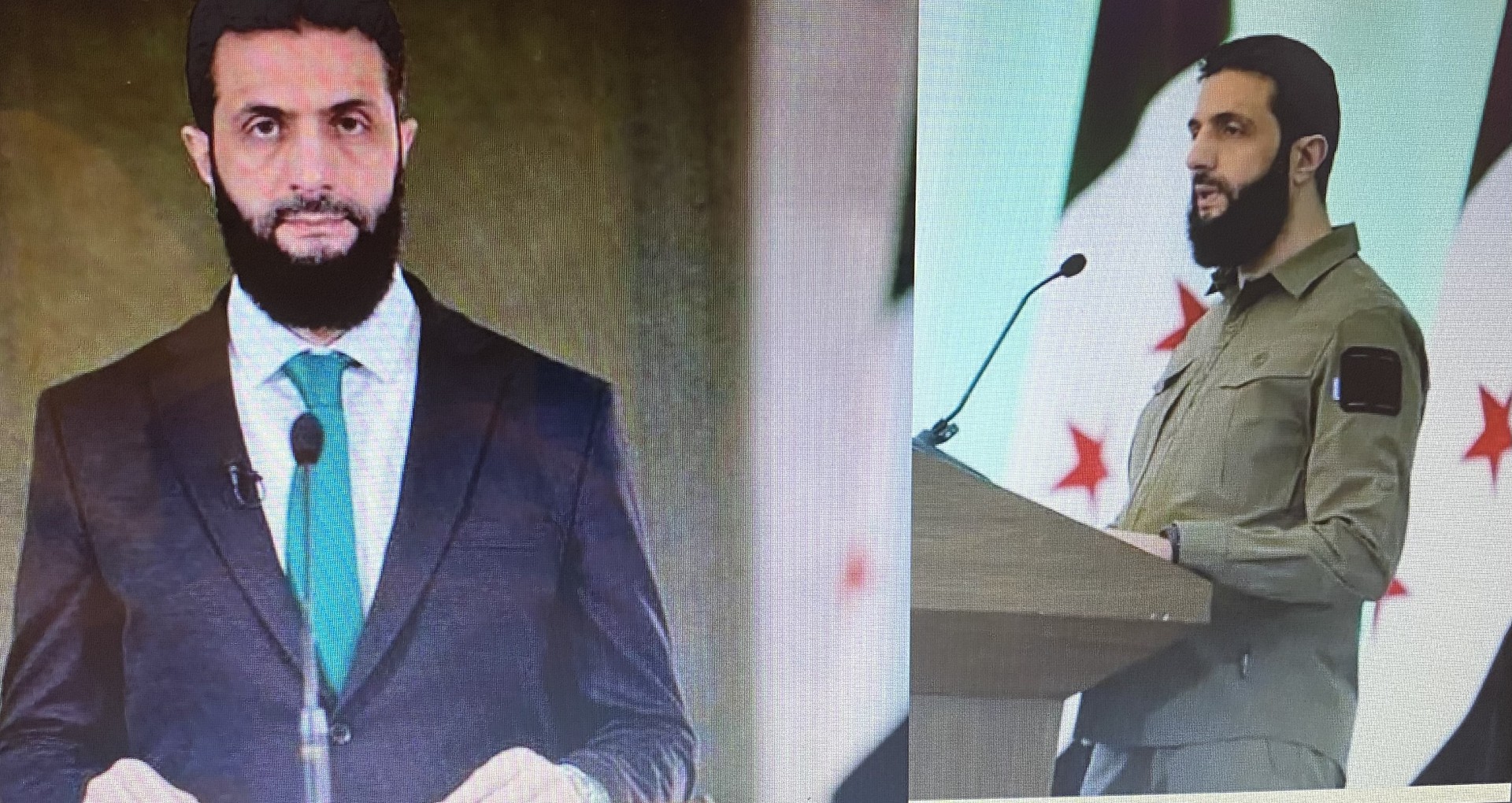Syria and the New Era: A Tale of Two Speeches
By Ola Rifai
In the last 48 hours, the newly appointed interim president, Ahmad al-Sharaa, delivered two significant speeches that mark critical moments for both; himself and Syria. His first speech signifies the end of a military and ideological chapter, while the second outlines a roadmap toward the Third Syrian Republic.
On Wednesday, January 29th, Mr. al-Sharaa delivered his ‘victory speech’ at the ‘Conference for Announcing the Victory of the Syrian Revolution,’ an event that hosted members of armed factions and revolutionary forces. Before al-Sharaa took the stage, Commander Hassan Abdul Ghani declared him president of the transitional phase, announcing the cancellation of Syria’s 2012 constitution, the dissolution of the Ba’ath Party along with the former parliament, army, and security institutions. And, more importantly, the merging of the various military factions into the state.
Shortly afterward, al-Sharaa gave an impassioned yet humble ‘victory speech,’ donning an olive-green military uniform and standing amid large Syrian flags. He stressed that resilience should be underpinned by tolerance and justice, while also praising the ‘bloodless’ victory in ousting Assad. Al-Sharaa evoked Syria’s glorious past, describing Damascus as a ‘devoted mother’ watching her children with eyes full of pain and reproach—bleeding yet enduring, on the brink of collapse and crying out, ‘Save your nation.’ The rebels, he said, came on December 8th and saved her.
Among the attendants were commanders from various military factions, such as Ahmad Issa Sheikh; commander of the Suqor al-Sham Brigade and governor of Idlib, Abu Hatem Shaqra; commander of Ahrar al-Sharqiya, Azzam Gharib; general commander of the Sham Front and governor of Aleppo, Fadlallah al-Haji; chief of staff of the Syrian National Army, Mohammad Jasem (known as Abu ‘Amsha); leader of the Turkish-backed Suleyman Shah Brigad, and Salme al-Antri; commander of the Syrian Free Army.
The significance of al-Sharaa’s speech lies in the timing, coming right after the dissolution of 18 armed factions that, despite working together in Deter the Aggression (the military operation which ousted Assad), had long fought for control over northern Syria. Their transition from rivalry to unity eliminated a critical obstacle and paved the way for state-building. In other words, the merging of these factions reduced the risk of Syria experiencing the “Libyanization” that many feared. Al-Sharaa’s speech affirmed that the military was united under his leadership. He addressed his audience, mostly military personnel, declaring that Syria’s liberation was complete and that now, ‘our duty is to build it.’
The next day, Thursday, January 30th, al-Sharaa made another appearance in a televised speech, this time wearing a black suit and a bright green tie, as he addressed the Syrian people for the first time since the collapse of Assad’s regime. This brief five-minute speech marked a shift in al-Sharaa’s political career and, more importantly, outlined a roadmap for Syria’s future which revolves around three key pillars: unity, justice, and inclusion.
In the same token, Al-Sharaa’s proposed formula for state-building involves transitional justice, the rebuilding of state institutions, and economic recovery. Though he did not elaborate on the mechanisms for implementing this plan, he did state his intention ‘to hold a national dialogue conference…a direct platform for discussions to hear different perspectives on our future political program.’
What stands out in this speech is al-Sharaa’s tendency to create a civil state, calling on all Syrians to participate in ‘building the future that is based on freedom and dignity, without exclusion or marginalization.’ He advocated for the formation of a ‘comprehensive transitional government that represents Syria’s diversity, including men, women, and youth, to rebuild the country’s institutions until free and fair elections can be held’. Thus, al-Sharaa’s roadmap envisions a civil state—a state based on institutions and a constitution, not a military or Islamic state.
Moreover, al-Sharaa sought to rebuild the relationship between the state and society, and to construct trust between the state and its people. He pledged to the Syrian people, ‘I speak to you today not as a ruler, but as a servant to our wounded nation, determined to achieve Syria’s unity and revival.’ This rhetoric is certainly new for Syrians who were subjected to Assad personality cult for the past five decades.
Here in, al-Sharaa’s speech on Thursday resonated with many Syrians, winning the hearts and minds of both opponents and supporters. Yet, between the two speeches lies two stories: one of a military leader fighting for control, and the other of a statesman committed to rebuilding the country. Clearly, the task is not easy and is situated within a larger geopolitical context. However, unifying the armed forces and gaining public support would certainly facilitate this mission.

